Le 15/8 (Chantal Akerman + Samy Szlingerbaum, 1975)
Aug
15
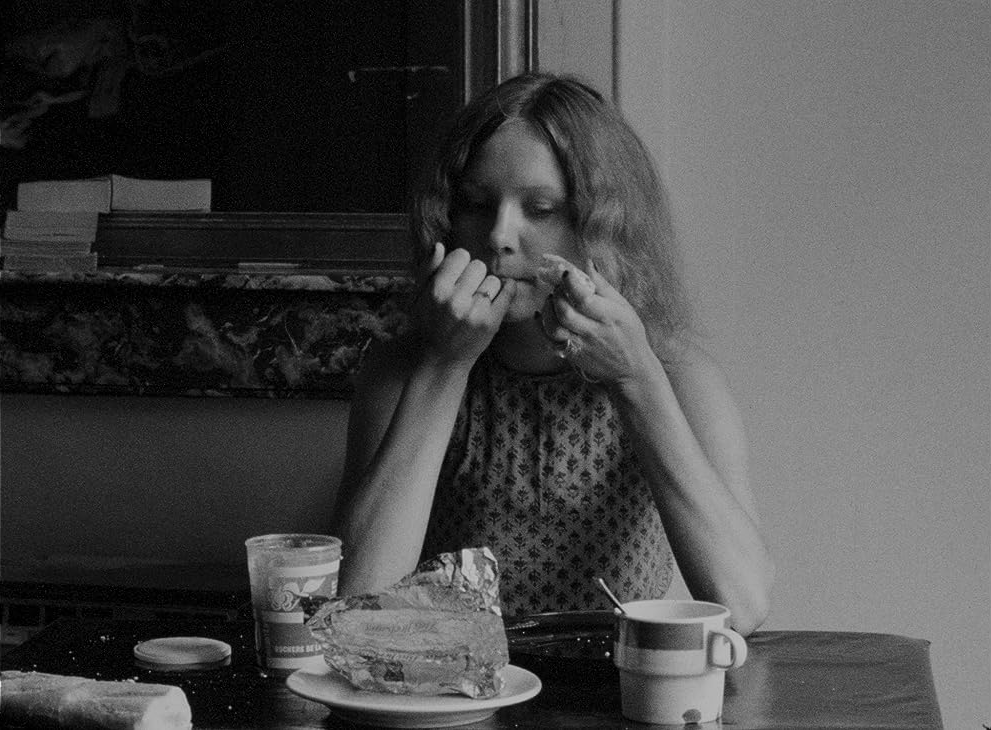
Chris Myllykoski. DPs: Chantal Akerman & Samy Szlingerbaum.
France
“The painter takes his time. He doesn't like her dress. He doesn't like her gloves. One day he asks her if she dares pose for him – all in pink. She dares! And the king, enraptured by her pose, offers her a palace!” Lola Montès (Max Ophüls, 1955)
Aug
14
Bavaria
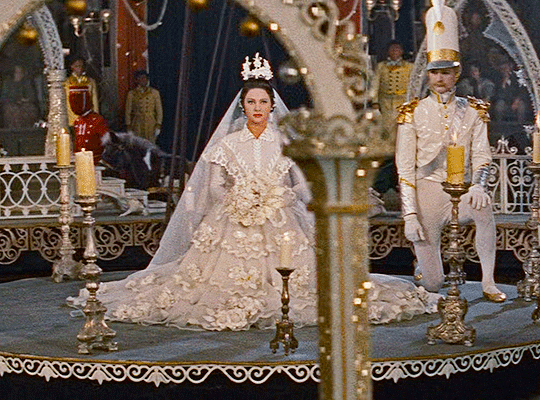
The crowned royal mistress on display in glorious Eastmancolor (via). DP: Christian Matras.
Celebrating Oktoberfest [in September/October] and the Bavarian royals [rip]: a royal character or family*
– circus master
Maria Dolores Porriz y Montez, Countess von Landsfeld, Lola Montès for short, now a circus attraction, once the mistress to Ludwig I, King of Bavaria. While her fellow circus performers play Lola's former lovers, the ringmaster tells her story.
* the Bales 2025 Film Challenge for August is not date-related but lists, for the most part, the colours of the rainbow.
“Eh, i sogni a volte insegnano male, Dùnya, perché la verità intera non è mai in un solo sogno, la verità intera è in molti sogni.” Il fiore delle mille e una notte [Arabian Nights] (Pier Paolo Pasolini, 1974)
Aug
13
cerulean
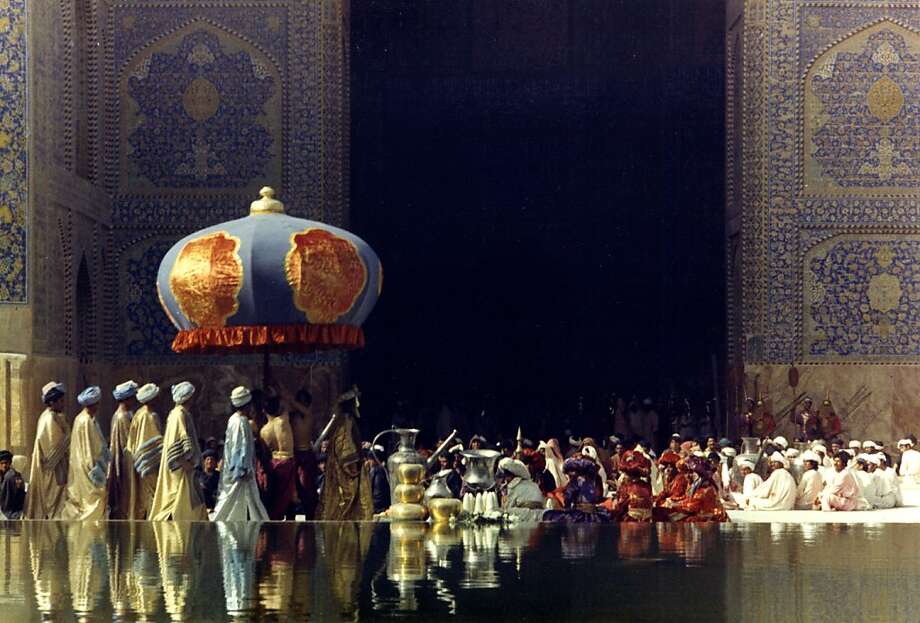
The entrance of the Shah Mosque as seen in the film. The seven colours of the tile work are reflected in the extras' costumes. DP: Giuseppe Ruzzolini.
Cerulean, or blue: a building or structure*
One of the many exotic locations is the مسجد شاه, [Masjed-e Shah, or Shah Mosque] in Iran with its otherworldly blue and blue-adjacent tiles.
* the Bales 2025 Film Challenge for August is not date-related but lists, for the most part, the colours of the rainbow.
– You know, I take pictures, photographs, but I never really thought in black and white before I saw our rushes. Do you know what I mean? You can see the shape of things.
– Life is in colour, but black and white is more realistic.Der Stand der Dinge [The State of Things] (Wim Wenders, 1982)
Aug
13
1942

Friedrich Munro's (Patrick Bauchau) Hollywood, Ca address and date of birth: August 13, 1942. DPs: Henri Alekan, Fred Murphy & Martin Schäfer.
“She'd discovered a small beach far from town, with crystal-clear water and pink sand. She loved that spot. The colors of nature were so beautiful, and there was no noise. She'd leave only when the sun did too.” Il deserto rosso [Red Desert] (Michelangelo Antonioni, 1964)
Aug
12
green
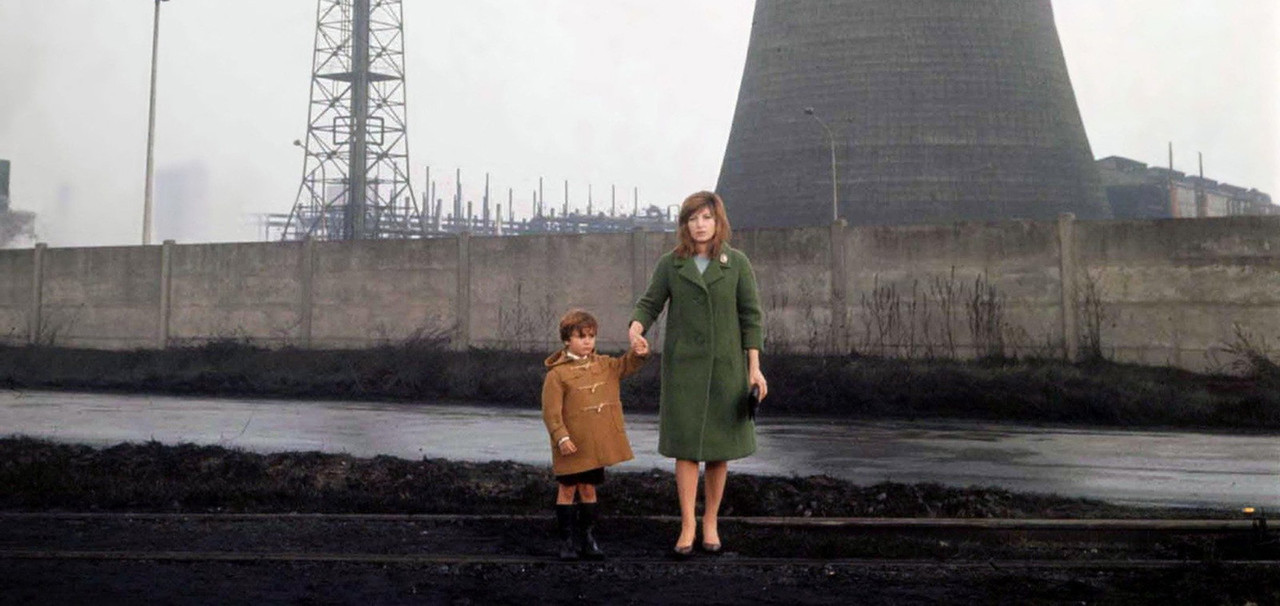
Valerio (Valerio Bartoleschi) and his mother Giuliana (Monica Vitti) in an arid industrial landscape. Giuliana wears a brilliant green coat, its shade between pea and moss, depending on the drabness of her surroundings. DP: Carlo Di Palma.
Green, in food or fashion*
– Giuliana
Antonioni's first film in colour beautifully utilises Vitti's brilliance – of her auburn hair, her porcelain teint, her vivid costumes (by Paola Carloni) – against the drab landscape.
* the Bales 2025 Film Challenge for August is not date-related but lists, for the most part, the colours of the rainbow.
E-clip-se (Chris Marker, 1999)
Aug
11
1999
.png)
A young woman or child at the Jardin des plantes de Paris wears protective glasses while looking up in amazement during the August 11, 1999 solar eclipse, her baguette a vague memory. DP: Chris Marker.
“Tourists prefer the trendy colors, yellow and blue. Pacing fancies, hotels are painted yellow and blue. Blue wins. All women want to be fashionable. All women wear blue, except the English, those learning to swim, and the Germans, who are dedicated to green.”Du côté de la côte [Along the Coast] (Agnès Varda, 1958)
Aug
9
yellow
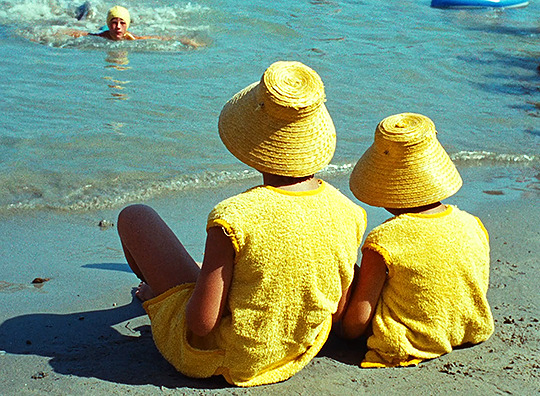
Two people, one big one small, in identical canary yellow robes and straw sun hats on the beach (more here). DPs: Quinto Albicocco & Raymond Castel.
Yellow, in food or fashion*
– narrator
* the Bales 2025 Film Challenge for August is not date-related but lists, for the most part, the colours of the rainbow.
“Life has its tricks. Its oddities.”La baie des anges [Bay of Angels] (Jacques Demy, 1963)
Aug
6
mercredi
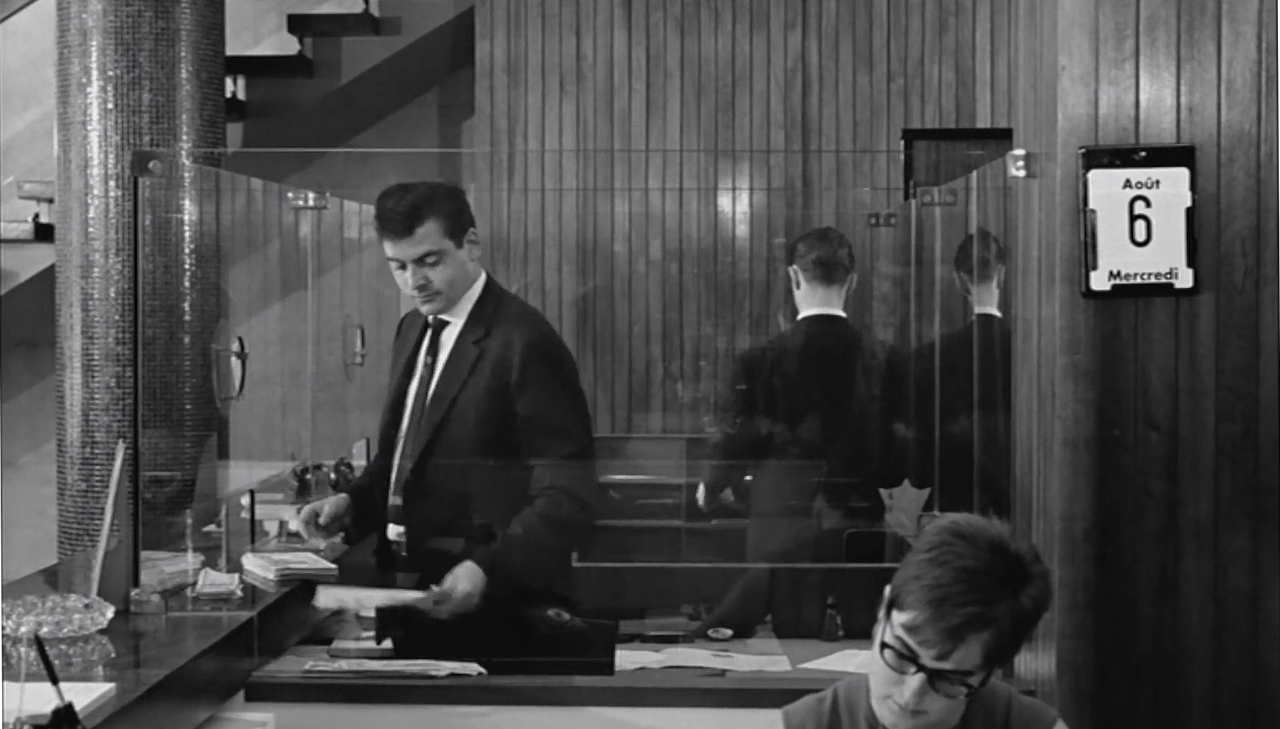
The bank where Jean Fournier (Claude Mann) works. A wall calendar, slightly tilted, reads Août 6 Mercredi. DP: Jean Rabier.
– Jackie Demaistre
Paparazzi (Jacques Rozier, 1963/1964)
Jul
29
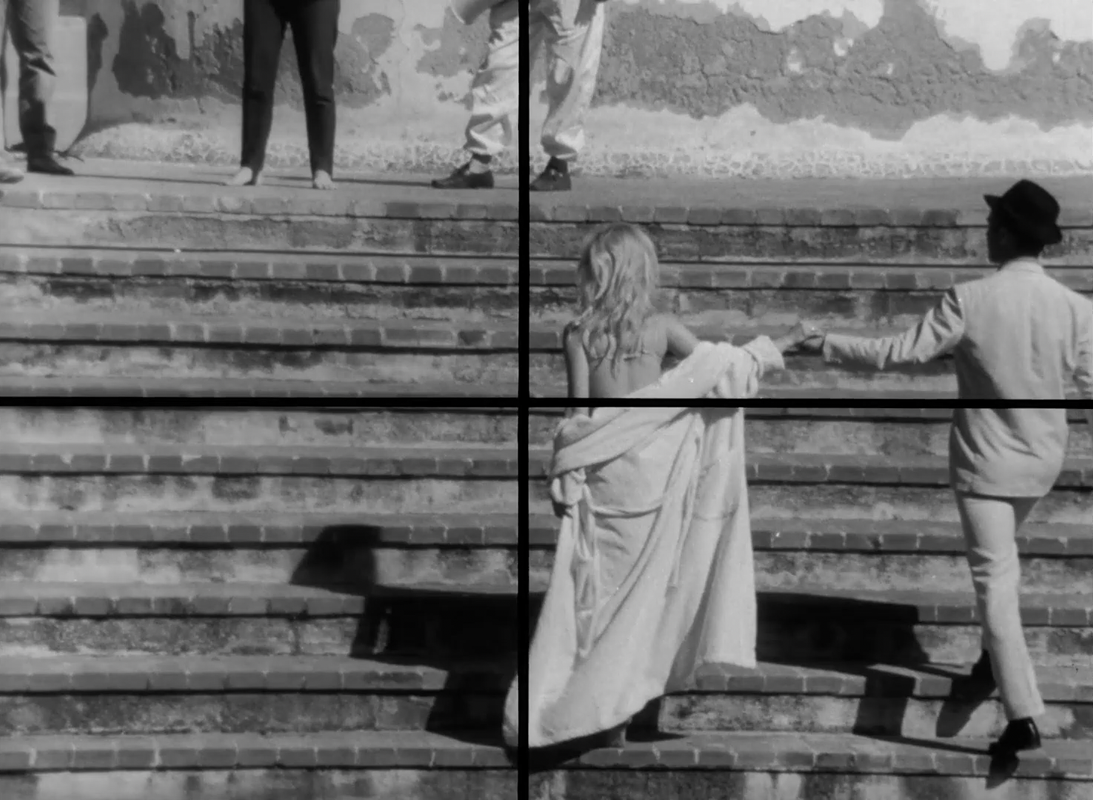
Brigitte Bardot and her co-star Michel Piccoli making a show of ascending the stairs of Casa Malaparte as seen through a paparazzo's lens. DP: Maurice Perrimond.
A character has a camera or takes photos*
It buzzes on the set of Le mépris. These mosquitos, the Italians say paparazzi, swarm La Bardot and making it merely impossible for anyone – themselves included – to do their job. But Bardot knows them, too well, and gives them what they want, when she wants it.
* the Bales 2025 Film Challenge for July is, for unknown reasons, mostly not date-related and follows some sort of vacation narrative.
“On the night of July 25, 1958 I killed Ladislaw Zukarevitch, antique dealer, my mentor, my master in the art of polishing diamonds, my tutor at Warsaw Theological School.”Les trois couronnes du matelot [Three Crowns of the Sailor] (Raúl Ruiz, 1983)
Jul
25
1958
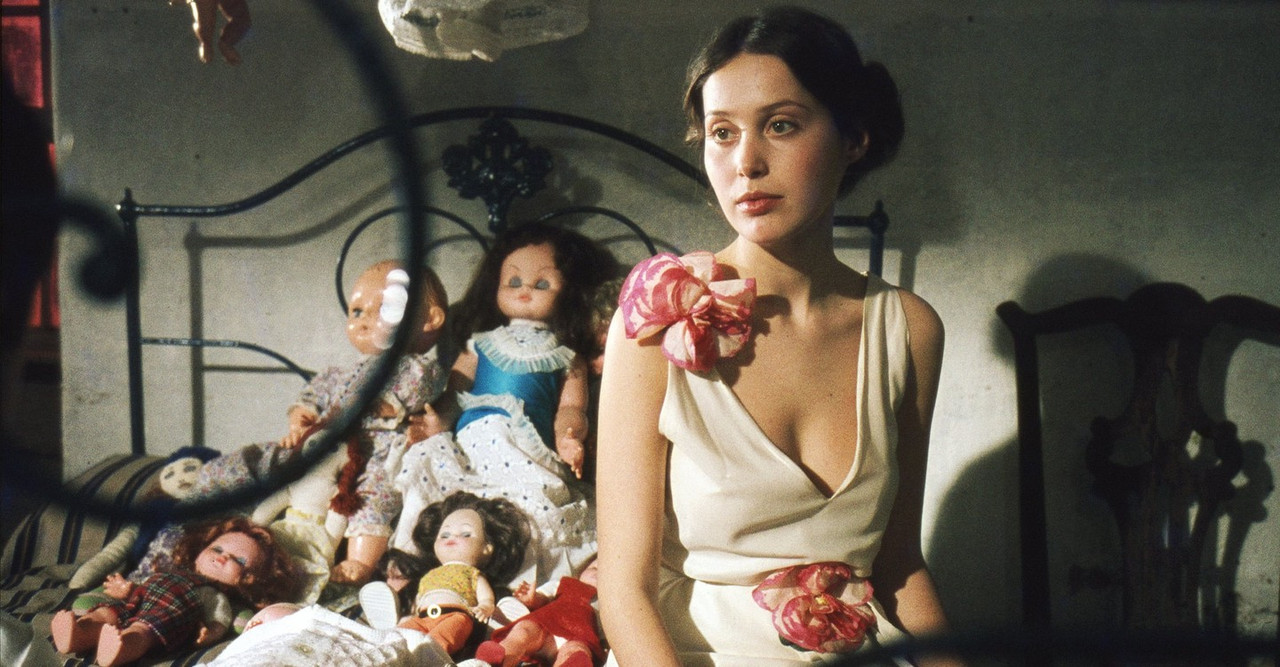
Prostitute María (Nadège Clair) sitting on her bed. The bed is covered in dolls. DP: Sacha Vierny.
– the student